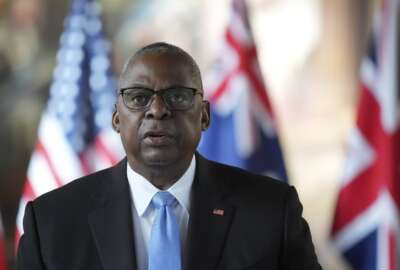Air Force looks to reboot civilian cyber workforce
Officials aim to redefine operational series codes for civilian cybersecurity workers and offer more pay for additional expertise. The Air Force would like to c...
wfedstaff | April 17, 2015 4:48 pm
The Air Force believes it’s done a good job developing a coherent workforce strategy for its uniformed cadre of cyber workers. But it’s less satisfied with how it’s done so far at managing the career fields of their civilian counterparts. So, the service wants to revamp the way its civilian cyber experts are trained, organized and paid.
While that population of civil servants does vital work, their job titles and their compensation don’t necessarily reflect what they do, said Maj. Gen. Earl Matthews, whose job it is to develop the Air Force’s cyber workforce.
“The occupational series codes we use are the same ones that were in existence when the general schedule was created 50 years ago,” he said. “It’s time for an overhaul of the entire system.”
Matthews, who serves as the director for cyberspace operations on the Pentagon Air Staff, said while the Air Force does have a cyber career field for civilians, their occupational series codes don’t reflect that, nor do they describe the skills those civilians have or need. To assemble its cyber workforce several years ago, Matthews said the Air Force simply used occupational codes from a previous era and dubbed those employees cyber workers.
“And we moved them all into this bucket, and we said, ‘You’re all now cyber people.’ When you look at our civilians, there are 42 occupational series codes that make up the communications and information career field, everything from general administration to librarians to data clerks. That’s probably not where we’re headed for the future,” he told a luncheon Friday hosted by AFCEA’s Northern Virginia chapter. “So we’re trying to figure out the right occupational series codes by skill sets.”
Elite cadre of civilian cyber warriors
Matthews said the federal civil service’s system for compensating people isn’t terribly well-suited for the dynamic field of cyber either. He said the Air Force would like to build a specialized cadre of elite cyber warriors within its civilian ranks, and traditional civilian pay scales don’t make that an easy task. 
He said the Air Force is at the very beginning of an effort to find legal ways to award higher pay to certain highly-skilled individuals in high-demand occupations.
“In some of our federal agencies, you can have a GS-14 supervising a GS-15, because it’s about their technical experience and the pay that goes along with that, not what grade they are. That’s not the way we do things in the Air Force or any of the other military services, because a GS-15, by code, has to supervise a certain amount of people in order to get that rank. We have to break that paradigm,” he said. “If you’re one of these civilians and you’re working in a specialized job, maybe you ought to get more pay regardless of what your grade is. And if you move to another job that doesn’t require those skills, maybe your pay goes back down. We’re trying to turn over this whole dynamic. We cannot continue to operate our civilian workforce in the manner we have been for the past number of years.”
NICE keys whole of government approach
Matthews said the Air Force won’t go it alone as it works to overhaul the occupational codes and skill set definitions it employs for its civilians. He said the entire Defense Department needs to have a common set of standards for cyber training, as do civilian agencies. So the service plans to lean heavily on governmentwide cyber workforce programs such as the National Initiative for Cybersecurity Education.
“We’re working as a whole of government to define these roles, training and certification and expertise, so that when people move from one part of the government to another part of the government we can talk the same language,” he said. “There’s another document we use, the 42 cyberspace work roles developed by U.S. Cyber Command. So we take these two documents and boil them down and say, ‘OK, this is the type of training we need.’ It’s not easy, but there’s a very good whole-of-government synergy to work this together and not work it separately.”
Also, as the military works to beef up its ranks of cyber warriors, Matthews said the Air Force has just launched a reassessment of the way it organizes its uniformed workforce.
He said the service hopes to answer questions such as whether the Air Force will need to create new squadrons dedicated to the cyber profession or whether those experts should fill existing squadrons, how much of that workforce should be directed toward the active component of the Air Force and how much should go to the reserves.
“We’re in a six-month look right now across the Air Force on whether we have the right mix between active, guard and reserve,” he said. “In cyber, this has a lot of potential when we create reserve associate units that are married up with active duty units, so the reservists can bring the experience they’ve gained in the companies they work for in this mission space and put them in those kinds of centers. This is a perfect alignment. We’re going to see some of this balance get sorted out in the next few months.”
RELATED STORIES:
Air Force aims to turn cyber into a career
DoD standardizing, synchronizing cyber training
DoD constructing offensive, defensive cyber teams
Copyright © 2024 Federal News Network. All rights reserved. This website is not intended for users located within the European Economic Area.
Jared Serbu is deputy editor of Federal News Network and reports on the Defense Department’s contracting, legislative, workforce and IT issues.
Follow @jserbuWFED






